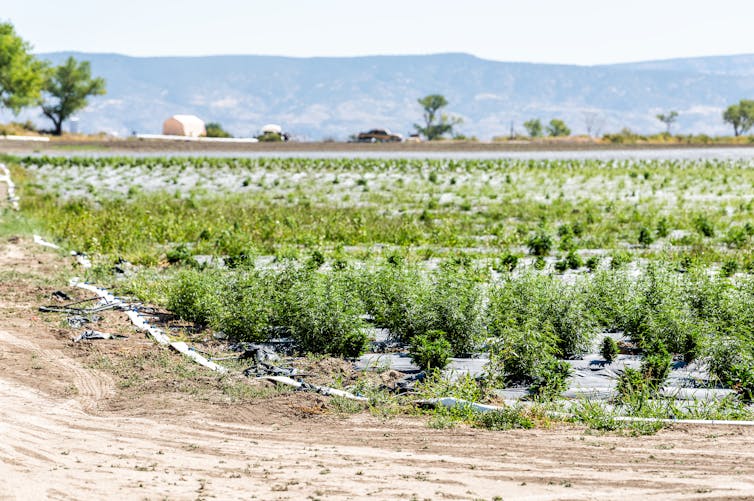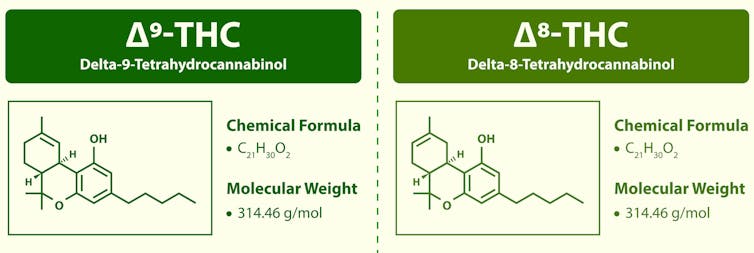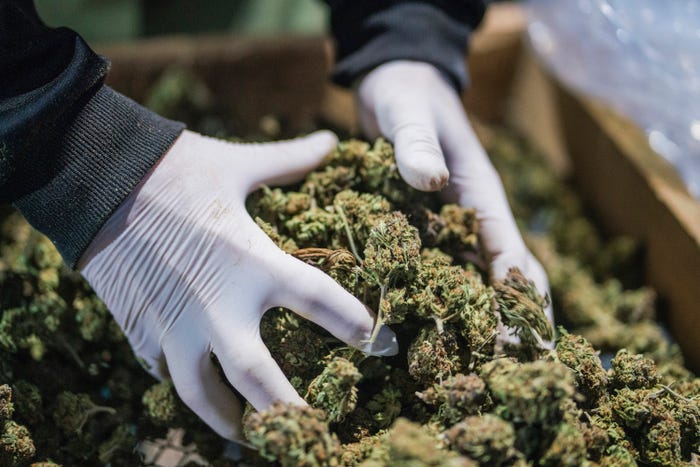Can delta-8 THC provide some of the benefits of pot – with less paranoia and anxiety?

krblokhin/Getty Images
Daniel J. Kruger, University of Michigan and Jessica S. Kruger, University at Buffalo
Over the past year, you may have seen something called delta-8 THC or “delta 8” appear in convenience stores and pharmacies alongside CBD gummies, oils and lotions.
Delta-8 THC is a hemp-derived compound that’s closely related to delta-9 THC – what’s commonly called THC and is the psychoactive component of cannabis that’s responsible for the high that users feel.
Like garden variety marijuana, delta-8 THC can be vaped or eaten. However, it’s rarely smoked. Anecdotally, its fans swear by its benefits – that it helps with relaxation and pain relief without intense highs that can veer into anxiety or paranoia.
Yet there’s been a dearth of research on this compound. As public health scholars, we decided to conduct the first survey of delta-8 THC users to find out who was using it, why they were using it and what sort of effects it had.
The latest cannabinoid to storm the market
The 2018 Agriculture Improvement Act – also known as the farm bill – legalized the sale of hemp-derived compounds. The widely available CBD is a hemp-derived compound.
Delta-8 THC is another. It’s an isomer, or chemical analog, of THC. The difference is in the position of a double bond in the carbon ring, which makes delta-8 THC have a lower affinity for the CB1 receptor of the endocannabinoid system in our brains. For this reason, it may be less potent than THC and cause a less-intense high.

About time/Getty Images
Natural concentrations of delta-8 THC in cannabis are too low for it to be effectively smoked in raw bud or flower. It needs to be extracted from large amounts of plant material, transformed from another cannabinoid like CBD, or synthesized chemically. The Drug Enforcement Administration considers artificially
synthesized delta-8 THC illegal.
Nonetheless, delta-8 THC products have become one of the fastest-growing sectors of the hemp industry. They seem to be especially popular in areas where THC products remain illegal or medical access is very difficult.
There is little research on this component of cannabis. One study from 1973 found that the effects of delta-8 THC mimicked those of THC, but weren’t as intense. Another, published in 1995, suggested that delta-8 THC could be used as a therapeutic treatment for the adverse effects of chemotherapy.
These studies, however, enrolled only a dozen individuals, and few policymakers seem to even be aware of their existence. While delta-8 THC can be bought in convenience stores and hemp shops in many states, over a dozen U.S. states have blocked the sale of delta-8 THC products due to a lack of research on its psychoactive effects and concerns over contamination with heavy metals and other toxic substances.
Clearing the smoke with science
In our study, we collected data via an online survey that was completed by more than 500 participants across 38 states.
Most of our participants consumed delta-8 THC through concentrates that were either eaten as edibles and tinctures or smoked by vaping – methods of ingestion that may be safer than smoking. About half said they used delta-8 THC to treat a health or medical condition, and almost one-third of participants said they exclusively used delta-8 THC to treat a health condition – they didn’t use it just for fun. Common conditions treated were anxiety or panic attacks, chronic pain, depression or bipolar disorder, and stress – afflictions that people also treat with delta-9 THC.
As we expected, participants thought that delta-8 THC had effects that were somewhat less intense compared with THC.
What’s remarkable, though, is how the profiles of their experiences differ.
Compared with THC, delta-8 THC appears to provide similar levels of relaxation and pain relief. While it seems to cause slightly lower levels of euphoria, it also seems to produce fewer cognitive distortions such as an altered sense of time, short-term memory issues and difficulty concentrating. Participants were also much less likely to experience distressing mental states such as anxiety and paranoia. Many participants remarked how they could use delta-8 THC and still be productive, whereas they tended to use THC products recreationally, given its more potent, mind-altering effects.
Most participants reduced or stopped using pharmaceutical drugs, as well as THC products, because they were using delta-8 THC to treat their conditions. They considered delta-8 THC better than pharmaceutical drugs in terms of adverse side effects, addictiveness, withdrawal symptoms, effectiveness, safety, availability and cost.
[Get the best of The Conversation, every weekend. Sign up for our weekly newsletter.]
However, participants weren’t confident that their primary care doctor could integrate medical cannabis into their course of treatment. For this reason, many hadn’t disclosed their use of delta-8 THC as a substitute for pharmaceutical drugs to their doctors.
These patterns demonstrate the need for more research and better education for health care providers on cannabis and its derivatives; there continues to be a disconnect between those who use cannabis to self-medicate and the mainstream health care system.
More to be done
Our findings are just the start. We hope that they’ll spur more sophisticated research, such as double-blind randomized controlled trials that explore its treatment potential for specific conditions. And we still don’t know if some of the effects reported by our participants, both beneficial and harmful, were due to contaminants or expectations – a placebo effect.
Yet even though delta-8 THC products may provide much of the experiential and therapeutic benefits, with lower risks and fewer adverse effects, some states have outright banned delta-8 THC sales. Since many of those same states permit the recreational sale of cannabis and other hemp products, this seems a bit paradoxical.
Criminalizing substances with high consumer demand like delta-8 THC can create a black market and produce even more concerns for consumer safety, as there’s no mechanism for the regulation and protection of consumers.
Cannabis laws remain a patchwork of policies and regulations. With more and more Americans having access to cannabis for medicinal and recreational purposes, we believe it behooves policymakers to advocate for further study of this promising alternative.
Daniel J. Kruger, Research Assistant Professor, University of Michigan and Jessica S. Kruger, Clinical Assistant Professor of Community Health and Health Behavior, University at Buffalo
This article is republished from The Conversation under a Creative Commons license. Read the original article.















